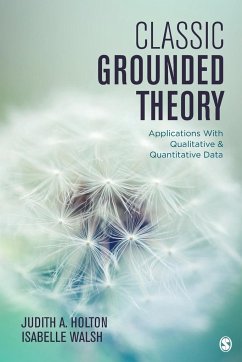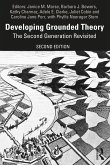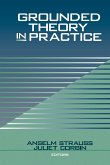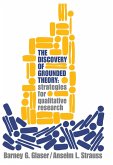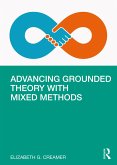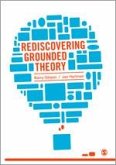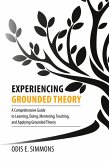Judith A. Holton, Isabelle Walsh
Classic Grounded Theory
Applications With Qualitative and Quantitative Data
Judith A. Holton, Isabelle Walsh
Classic Grounded Theory
Applications With Qualitative and Quantitative Data
- Broschiertes Buch
- Merkliste
- Auf die Merkliste
- Bewerten Bewerten
- Teilen
- Produkt teilen
- Produkterinnerung
- Produkterinnerung
This book provides practical step-by-step guidance for doing grounded theory (GT) using the classic approach articulated by Barney Glaser.
Andere Kunden interessierten sich auch für
![Developing Grounded Theory Developing Grounded Theory]() Janice M. MorseDeveloping Grounded Theory47,99 €
Janice M. MorseDeveloping Grounded Theory47,99 €![Grounded Theory in Practice Grounded Theory in Practice]() Anselm StraussGrounded Theory in Practice160,99 €
Anselm StraussGrounded Theory in Practice160,99 €![Discovery of Grounded Theory Discovery of Grounded Theory]() Barney G. GlaserDiscovery of Grounded Theory68,99 €
Barney G. GlaserDiscovery of Grounded Theory68,99 €![Advancing Grounded Theory with Mixed Methods Advancing Grounded Theory with Mixed Methods]() Elizabeth G. CreamerAdvancing Grounded Theory with Mixed Methods142,99 €
Elizabeth G. CreamerAdvancing Grounded Theory with Mixed Methods142,99 €![Advancing Grounded Theory with Mixed Methods Advancing Grounded Theory with Mixed Methods]() Elizabeth G. CreamerAdvancing Grounded Theory with Mixed Methods42,99 €
Elizabeth G. CreamerAdvancing Grounded Theory with Mixed Methods42,99 €![Rediscovering Grounded Theory Rediscovering Grounded Theory]() Barry GibsonRediscovering Grounded Theory60,99 €
Barry GibsonRediscovering Grounded Theory60,99 €![Experiencing Grounded Theory Experiencing Grounded Theory]() Odis E SimmonsExperiencing Grounded Theory55,99 €
Odis E SimmonsExperiencing Grounded Theory55,99 €-
-
-
This book provides practical step-by-step guidance for doing grounded theory (GT) using the classic approach articulated by Barney Glaser.
Hinweis: Dieser Artikel kann nur an eine deutsche Lieferadresse ausgeliefert werden.
Hinweis: Dieser Artikel kann nur an eine deutsche Lieferadresse ausgeliefert werden.
Produktdetails
- Produktdetails
- Verlag: SAGE Publications Inc
- Seitenzahl: 258
- Erscheinungstermin: 9. März 2016
- Englisch
- Abmessung: 229mm x 152mm x 14mm
- Gewicht: 352g
- ISBN-13: 9781483372549
- ISBN-10: 1483372545
- Artikelnr.: 43673571
- Herstellerkennzeichnung
- Libri GmbH
- Europaallee 1
- 36244 Bad Hersfeld
- gpsr@libri.de
- Verlag: SAGE Publications Inc
- Seitenzahl: 258
- Erscheinungstermin: 9. März 2016
- Englisch
- Abmessung: 229mm x 152mm x 14mm
- Gewicht: 352g
- ISBN-13: 9781483372549
- ISBN-10: 1483372545
- Artikelnr.: 43673571
- Herstellerkennzeichnung
- Libri GmbH
- Europaallee 1
- 36244 Bad Hersfeld
- gpsr@libri.de
Judith Holton completed her Masters in Leadership at Royal Roads University, Victoria (Canada) and her PhD in Management Studies at the University of Northampton (UK). During her PhD research, she was closely mentored by Barney Glaser. She has written a number of methodological papers and books about classic grounded theory and was the founding editor of The Grounded Theory Review as a peer-reviewed journal dedicated to classic grounded theory research. She is currently Associate Professor of Management in the Ron Joyce Centre for Business Studies at Mount Allison University, Sackville (Canada) where she teaches strategy, leadership and organizational change.
An Overview of Classic Grounded Theory
1. Situating Grounded Theory on the Research Landscape
The Early Development of Grounded Theory
Are Glaserian and Straussian GT Reconcilable?
The Nature and Power of Classic GT
Emergence of the Classic GT Paradigm
In Summary
Test Your Knowledge
Further Reading
2. Discovering New Theory as the End Purpose of Classic Grounded Theory
What Is a Theory?
The Drive From Substantive to Formal GT
Theorizing in Rupture With Existing Literature
In Summary
Test Your Knowledge
Further Reading
3. Foundational Pillars of Classic Grounded Theory
Emergence
Constant Comparative Analysis
Theoretical Sampling
Developing Your Stance as a Grounded Theorist
In Summary
Test Your Knowledge
Further Reading
4. Clarifying Common Sources of Confusion in Grounded Theory
Emergence Versus Preconception
Description Versus Conceptualization
Substantive Versus Theoretical Coding
In Summary
Test Your Knowledge
Further Reading
Classic Grounded Theory in Practice
5. Finding Your Data
Why "All Is Data"
Overlooked Sources of Available Data
Collecting Your Own Data
Data Collection and Analysis as an Iterative Process
In Summary
Test Your Knowledge
Further Reading
6. Analyzing Your Data
Conceptual Analysis as Distinct From Descriptive Analysis
Using Constant Comparative Analysis
Types and Stages of Coding in Grounded Theory
Core Category Emergence
The Key Role of Analytic Memoing in GT Analysis
The Iterative Nature of Data Analysis in Grounded Theory
To Software or Not to Software
In Summary
Test Your Knowledge
Further Reading
7. Shaping the Theory
Theoretical Sampling
Theoretical Saturation
Theoretical Coding
In Summary
Test Your Knowledge
Further Reading
Writing and Evaluating Classic Grounded Theory
8. Writing as an Important Part of Doing Classic GT
The Process Leading to the Readiness to Write Moment
Approaching the Literature in a GT Study
Writing GT With Mixed Quantitative and Qualitative Data
The First Draft
Writing Blocks
In Summary
Test Your Knowledge
Test Your Knowledge
Further Reading
9. Writing Classic GT for Publication
Doing Versus Writing
Writing Classic GT Using Mixed Data
Writing Conventions
Some Guidelines for Publishing Classic GT in Top Tier Research
In Summary
Test Your Knowledge
Further Reading
10. Evaluating Classic Grounded Theory
The Consequences of the Paradigm War
Criteria for Evaluating Grounded Theory
In Summary
Test Your Knowledge
Further Reading
Conclusion
Appendix A: Doing Qualitative Research Does Not Mean You Are Doing Classic
GT
Appendix B: Classic GT Using Qualitative Data
Appendix C: Doing Classic GT Using Mixed Qualitative and Quantitative Data
Appendix D: Some Examples of Theoretical Coding Using Mixed Qualitative and
Quantitative Data
Appendix E: Examples of Diagrams as Precursors of a Theory
1. Situating Grounded Theory on the Research Landscape
The Early Development of Grounded Theory
Are Glaserian and Straussian GT Reconcilable?
The Nature and Power of Classic GT
Emergence of the Classic GT Paradigm
In Summary
Test Your Knowledge
Further Reading
2. Discovering New Theory as the End Purpose of Classic Grounded Theory
What Is a Theory?
The Drive From Substantive to Formal GT
Theorizing in Rupture With Existing Literature
In Summary
Test Your Knowledge
Further Reading
3. Foundational Pillars of Classic Grounded Theory
Emergence
Constant Comparative Analysis
Theoretical Sampling
Developing Your Stance as a Grounded Theorist
In Summary
Test Your Knowledge
Further Reading
4. Clarifying Common Sources of Confusion in Grounded Theory
Emergence Versus Preconception
Description Versus Conceptualization
Substantive Versus Theoretical Coding
In Summary
Test Your Knowledge
Further Reading
Classic Grounded Theory in Practice
5. Finding Your Data
Why "All Is Data"
Overlooked Sources of Available Data
Collecting Your Own Data
Data Collection and Analysis as an Iterative Process
In Summary
Test Your Knowledge
Further Reading
6. Analyzing Your Data
Conceptual Analysis as Distinct From Descriptive Analysis
Using Constant Comparative Analysis
Types and Stages of Coding in Grounded Theory
Core Category Emergence
The Key Role of Analytic Memoing in GT Analysis
The Iterative Nature of Data Analysis in Grounded Theory
To Software or Not to Software
In Summary
Test Your Knowledge
Further Reading
7. Shaping the Theory
Theoretical Sampling
Theoretical Saturation
Theoretical Coding
In Summary
Test Your Knowledge
Further Reading
Writing and Evaluating Classic Grounded Theory
8. Writing as an Important Part of Doing Classic GT
The Process Leading to the Readiness to Write Moment
Approaching the Literature in a GT Study
Writing GT With Mixed Quantitative and Qualitative Data
The First Draft
Writing Blocks
In Summary
Test Your Knowledge
Test Your Knowledge
Further Reading
9. Writing Classic GT for Publication
Doing Versus Writing
Writing Classic GT Using Mixed Data
Writing Conventions
Some Guidelines for Publishing Classic GT in Top Tier Research
In Summary
Test Your Knowledge
Further Reading
10. Evaluating Classic Grounded Theory
The Consequences of the Paradigm War
Criteria for Evaluating Grounded Theory
In Summary
Test Your Knowledge
Further Reading
Conclusion
Appendix A: Doing Qualitative Research Does Not Mean You Are Doing Classic
GT
Appendix B: Classic GT Using Qualitative Data
Appendix C: Doing Classic GT Using Mixed Qualitative and Quantitative Data
Appendix D: Some Examples of Theoretical Coding Using Mixed Qualitative and
Quantitative Data
Appendix E: Examples of Diagrams as Precursors of a Theory
An Overview of Classic Grounded Theory
1. Situating Grounded Theory on the Research Landscape
The Early Development of Grounded Theory
Are Glaserian and Straussian GT Reconcilable?
The Nature and Power of Classic GT
Emergence of the Classic GT Paradigm
In Summary
Test Your Knowledge
Further Reading
2. Discovering New Theory as the End Purpose of Classic Grounded Theory
What Is a Theory?
The Drive From Substantive to Formal GT
Theorizing in Rupture With Existing Literature
In Summary
Test Your Knowledge
Further Reading
3. Foundational Pillars of Classic Grounded Theory
Emergence
Constant Comparative Analysis
Theoretical Sampling
Developing Your Stance as a Grounded Theorist
In Summary
Test Your Knowledge
Further Reading
4. Clarifying Common Sources of Confusion in Grounded Theory
Emergence Versus Preconception
Description Versus Conceptualization
Substantive Versus Theoretical Coding
In Summary
Test Your Knowledge
Further Reading
Classic Grounded Theory in Practice
5. Finding Your Data
Why "All Is Data"
Overlooked Sources of Available Data
Collecting Your Own Data
Data Collection and Analysis as an Iterative Process
In Summary
Test Your Knowledge
Further Reading
6. Analyzing Your Data
Conceptual Analysis as Distinct From Descriptive Analysis
Using Constant Comparative Analysis
Types and Stages of Coding in Grounded Theory
Core Category Emergence
The Key Role of Analytic Memoing in GT Analysis
The Iterative Nature of Data Analysis in Grounded Theory
To Software or Not to Software
In Summary
Test Your Knowledge
Further Reading
7. Shaping the Theory
Theoretical Sampling
Theoretical Saturation
Theoretical Coding
In Summary
Test Your Knowledge
Further Reading
Writing and Evaluating Classic Grounded Theory
8. Writing as an Important Part of Doing Classic GT
The Process Leading to the Readiness to Write Moment
Approaching the Literature in a GT Study
Writing GT With Mixed Quantitative and Qualitative Data
The First Draft
Writing Blocks
In Summary
Test Your Knowledge
Test Your Knowledge
Further Reading
9. Writing Classic GT for Publication
Doing Versus Writing
Writing Classic GT Using Mixed Data
Writing Conventions
Some Guidelines for Publishing Classic GT in Top Tier Research
In Summary
Test Your Knowledge
Further Reading
10. Evaluating Classic Grounded Theory
The Consequences of the Paradigm War
Criteria for Evaluating Grounded Theory
In Summary
Test Your Knowledge
Further Reading
Conclusion
Appendix A: Doing Qualitative Research Does Not Mean You Are Doing Classic
GT
Appendix B: Classic GT Using Qualitative Data
Appendix C: Doing Classic GT Using Mixed Qualitative and Quantitative Data
Appendix D: Some Examples of Theoretical Coding Using Mixed Qualitative and
Quantitative Data
Appendix E: Examples of Diagrams as Precursors of a Theory
1. Situating Grounded Theory on the Research Landscape
The Early Development of Grounded Theory
Are Glaserian and Straussian GT Reconcilable?
The Nature and Power of Classic GT
Emergence of the Classic GT Paradigm
In Summary
Test Your Knowledge
Further Reading
2. Discovering New Theory as the End Purpose of Classic Grounded Theory
What Is a Theory?
The Drive From Substantive to Formal GT
Theorizing in Rupture With Existing Literature
In Summary
Test Your Knowledge
Further Reading
3. Foundational Pillars of Classic Grounded Theory
Emergence
Constant Comparative Analysis
Theoretical Sampling
Developing Your Stance as a Grounded Theorist
In Summary
Test Your Knowledge
Further Reading
4. Clarifying Common Sources of Confusion in Grounded Theory
Emergence Versus Preconception
Description Versus Conceptualization
Substantive Versus Theoretical Coding
In Summary
Test Your Knowledge
Further Reading
Classic Grounded Theory in Practice
5. Finding Your Data
Why "All Is Data"
Overlooked Sources of Available Data
Collecting Your Own Data
Data Collection and Analysis as an Iterative Process
In Summary
Test Your Knowledge
Further Reading
6. Analyzing Your Data
Conceptual Analysis as Distinct From Descriptive Analysis
Using Constant Comparative Analysis
Types and Stages of Coding in Grounded Theory
Core Category Emergence
The Key Role of Analytic Memoing in GT Analysis
The Iterative Nature of Data Analysis in Grounded Theory
To Software or Not to Software
In Summary
Test Your Knowledge
Further Reading
7. Shaping the Theory
Theoretical Sampling
Theoretical Saturation
Theoretical Coding
In Summary
Test Your Knowledge
Further Reading
Writing and Evaluating Classic Grounded Theory
8. Writing as an Important Part of Doing Classic GT
The Process Leading to the Readiness to Write Moment
Approaching the Literature in a GT Study
Writing GT With Mixed Quantitative and Qualitative Data
The First Draft
Writing Blocks
In Summary
Test Your Knowledge
Test Your Knowledge
Further Reading
9. Writing Classic GT for Publication
Doing Versus Writing
Writing Classic GT Using Mixed Data
Writing Conventions
Some Guidelines for Publishing Classic GT in Top Tier Research
In Summary
Test Your Knowledge
Further Reading
10. Evaluating Classic Grounded Theory
The Consequences of the Paradigm War
Criteria for Evaluating Grounded Theory
In Summary
Test Your Knowledge
Further Reading
Conclusion
Appendix A: Doing Qualitative Research Does Not Mean You Are Doing Classic
GT
Appendix B: Classic GT Using Qualitative Data
Appendix C: Doing Classic GT Using Mixed Qualitative and Quantitative Data
Appendix D: Some Examples of Theoretical Coding Using Mixed Qualitative and
Quantitative Data
Appendix E: Examples of Diagrams as Precursors of a Theory

